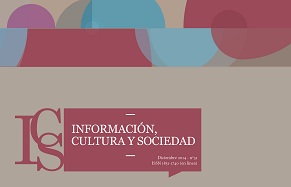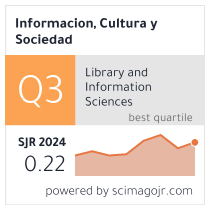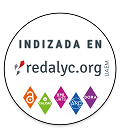Human Libraries. A systematic review of their conception and implementation in the educational sphere
Abstract
The need to cultivate inclusive and participatory environments in school settings justifies the implementation of strategies such as Human Libraries (HL), spaces where real individuals, referred to as “human books,” share their experiences and perspectives, thereby promoting empathy and dialogue. In this systematic literature review conducted following the PRISMA protocol, we examine the scientific literature on the implementation of HL in the educational context. The review covers the period from January 2000 to January 2024 and was carried out across the databases of Web of Science (WoS), Scopus, ERIC, Dialnet, and the Google Scholar search engine. Our review addresses seven research questions, grouped into four dimensions: the conception of HL in the educational context and their benefits, objects of study and participants, the implementation process and recommendations, challenges, and future research directions. Among the noteworthy findings is that HL, in addition to their educational function and their ability to counteract prejudices while fostering human connection, emerge as an innovative method associated with narrative research. This discovery provides valuable insights for future interventions and research endeavors that ensure the construction of educational environments free from violence. ARK CAICYT: http://id.caicyt.gov.ar/ark:/s18511740/mlk8lpldqDownloads
References
Abergel Ronni, Antje Rothermund, Gavan Titley y Wootsch Péter. 2005. Don’t judge a book by its cover! The living library organiser’s guide. Budapest: Council of Europe Publishing.
Aguiar, Vicente, Kelly Almeida-De-Oliveira y Rossini Pereira-Maduro. 2023. A educação e as corporeidades: As resistências nas existências. En Educación y Contemporaneidad. Vol. 32, no. 72, 351-369. <https://doi.org/10.21879/faeeba2358-0194.2023.v32.n72.p351-369>
Béres, Judit y Dóra Egervári. 2018. Read (Each)Other! The living library initiative at the University of Pécs. En Paideia. Vol. 6, no. 1, 7-16. <https://doi.org/10.33034/paideia.2018.6.1.7>
Blizzard, Kara, Yvonne Becker y Nancy Goebel. 2018. Bringing women’s studies to life: Integrating a human library into Augustana’s women’s studies curriculum. En College Quarterly. Vol. 21, no. 3, 1-18. <https://files.eric.ed.gov/fulltext/EJ1203529.pdf> [Consulta: 25 enero 2024].
Bryan, Jane y Kerry Dobbins. 2023. Food for the soul: Applying the human library concept to academic professional development. En Journal of Perspectives in Applied Academic Practice. Vol. 11, no. 2, 24-29. <https://doi.org/10.56433/jpaap.v11i2.526>
Boboňová, Ivana, Izabela Kurtek, Alexandra Škodová, Ľudmilla Galuščáková y Ľubomír Rybanský. 2020. Human libraries: The power of using stories in education. En Edulearn 20: 12th International Conference on Education and New Learning Technologies. Proceedings. Vol. 1. 4660-4667. <https://doi.org/10.21125/edulearn.2020.1227>
Bordonaro, Karen. 2020. The human library: Reframing library work with international students. En Journal of Library Administration. Vol. 60, no. 1, 97-108. <https://doi.org/10.1080/01930826.2019.1685271>
Brown, Deborah. 2016. School libraries as power-houses of empathy: People for loan in the human library. En IASL Conference Proceedings. Vol. 1. 35-46. <https://doi.org/10.29173/iasl7197>
Chang, Hsiao-Yun, Wen-Yun Tsai y Ya-Ling Huang. 2024. Dialogues with human books to promote professional commitment and learning among first-year nursing students: A mixed-methods study. En Nurse Education Today. Vol. 132, 106010. <https://doi.org/10.1016/j.nedt.2023.106010>
Dobreski, Brian y Yun Huang. 2016. The joy of being a book: Benefits of participation in the human library. En ASIS&T Proceedings of the Association for Information Science and Technology. Vol. 53, no. 1, 1-3. <https://doi.org/10.1002/pra2.2016.14505301139>
Fahed, Ziad. 2020. Teaching spiritual solidarity through “Human Books”. En Teaching Theology & Religion. Vol. 23, no. 3, 202-208. <https://doi.org/10.1111/teth.12551>
Giesler, Mark. 2021. Humanizing oppression: The value of the human library experience in social work education. En Journal of Social Work Education. Vol. 58, no. 2, 390–402. <https://doi.org/10.1080/10437797.2021.1885541>
Gómez Gómez, Elba Noemí. 2020. La historia oral. Una metodología de los excluidos. En Cambios y Permanencias. Vol. 11, no. 2, 1372-1394. <https://revistas.uis.edu.co/index.php/revistacyp/article/view/11756> [Consulta: 24 enero 2024].
Kudo, Kazuhiro, Yuri Motohashi, Yuki Enomoto, Yuki Kataoka y Yusaku Yajima. 2011. Bridging differences through dialogue: Preliminary findings of the outcomes of the human library in a university setting. En Proceedings of the 2011 Shanghai International Conference on Social Science (SICSS). (17-20 Agosto 2011: Shanghai). Shanghai, China: Crowne Plaza Shanghai Fudan. <https://acortar.link/4jhr0A> [Consulta: 22 enero 2024].
Kwan, Chi-Kin. 2020. A qualitative inquiry into the human library approach: Facilitating social inclusion and promoting recovery. En International Journal of Environmental Research and Public Health. Vol. 17, no. 9, 3029.
<https://doi.org/10.3390/ijerph17093029>
Lam, Gary Yu Hin, Hei Ting Wong y Mengge Zhang. 2023. A systematic narrative review of implementation, processes, and outcomes of human library. En International Journal of Environmental Research and Public Health. Vol. 20, no. 3, 2485. <https://doi.org/10.3390/ijerph20032485>
Latorre, Antonio. 2005. La investigación-acción. Conocer y cambiar la práctica educativa. Barcelona: Graó.
Lorenzano Schifrin, Sandra. 2022. Bibliotecas, género e inclusión. En Biblioteca Universitaria. Vol. 25, no. 1. <http://doi.org/10.22201/dgbsdi.0187750xp.2022.1.1452>
Malhi, Rebecca, Grace Perez, Javeria Shafiq y Aaron Johnston. 2023. Practical tips for using a human library approach in medical education. En MedEdPublish. Vol. 13, 208-215. <https://doi.org/10.12688/mep.19746.1>
Micheletti, Stefano, Sandra Vera y Javiera Cubillos Almendra. 2018. La biblioteca humana migrante: Uso del espacio público y resignificación del proceso migratorio. En Si Somos Americanos. Vol. 18, no. 2, 53-77.
<https://doi.org/10.4067/S0719-09482018000200053>
Monroy Flórez, Gloria Inés. 2023. Bibliotecas Humanas de la Vereda Montañuela en Copacabana – Antioquia: Mujeres campesinas mediadoras del conocimiento tradicional en la escuela rural. Barranquilla: Universidad de Antioquia. 101 p. Tesis de Maestría. <https://acortar.link/7mQDhZ> [Consulta: 22 de enero 2024]
Naik, Kasturi. 2020. Role of “human library intervention” in creating awareness of diversity and inclusion. En Psychology and Education. Vol. 57, no. 9, 7125-7130. <https://doi.org/10.17762/pae.v57i9.4580>
Page, Matthew, Joanne Mckenzie, Patrick Bossuyt, Isabelle Boutron, Tammy Hoffmann, Cynthia Mulrow, Larissa Shamseer, Jennifer Tetzlaff, Eli Akl, Sue Brennan, Roger Chou, Julie Glanville, Jeremy Grimshaw, Asbjørn Hróbjartsson, Manoj Lalu, Tianjing Li, Elizabeth Loder, Eva Mayo-Wilson, Steve McDonald, Luke McGuiness, Lesley Stewart, James Thomas, Andrea Tricco, Vivian Welch, Penny Whiting y David Moher. 2021. Declaración PRISMA 2020: una guía actualizada para la publicación de revisiones sistemáticas. En Revista Española de Cardiología. Vol. 74, no. 9, 790-799. <https://doi.org/10.1016/j.recesp.2021.06.016>
Pardasani, Rahul y William Rivera. 2017. Human library: An anti-oppressive tool. Implementation guidelines for a Human Library. Pori, Finlandia: Diaconia University of Applied Sciences. 53 p. Tesis de Maestría. <https://acortar.link/Vj3unO> [Consulta: 24 enero 2024].
Pope, Kerry. 2021a. Walking a mile in their shoes: empowering learners through a human library! En IASL Annual Conference Proceedings. Vol. 1. 657-664. <https://doi.org/10.29173/iasl8309>
Pope, Kerry. 2021b. You can’t judge a book by its cover! En IASL Annual Conference Proceedings. Vol. 1. 791-805. <https://doi.org/10.29173/iasl7828>
Ramírez-Montoya, María-Soledad y Jairo Lugo-Ocando. 2020. Systematic review of mixed methods in the framework of educational innovation. En Comunicar. Vol. 18, no. 65, 9-20. <https://doi.org/10.3916/C65-2020-01>
Safdar, Muhammad, Nadeem Siddique y Muhammad-Ajmal Khan. 2024. A systematic review of literature on human libraries: Objectives, benefits, and challenges. En Journal of Librarianship and Information Science. Vol. 53, no. 3, 785-795. <https://doi.org/10.1177/09610006231155886>
Schijf, Candy-May, Julieta Olivar, Jorge Bundalian y Marian Ramos-Eclevia. 2020. Conversations with human books: promoting respectful dialogue, diversity, and empathy among grade and high school students. En Journal of the Australian Library and Information Association. Vol. 69, no. 3, 390-408. <https://doi.org/10.1080/24750158.2020.1799701>
Sen, Robin, Nora McClelland y Beverley Jowett. 2019. Belonging to the library: Humanising the space for social work education. En McLaughlin, Hugh, Joe Duffy, Brendan Mckeever y June Sadd, eds. Service User Involvement in Social Work Education. Londres: Routledge. p. 33-45. <https://doi.org/10.4324/9781351232630-5>
Sierra Martínez, Silvia, María Fiuza Asorey y Ángeles Parrilla. 2019. Investigación participativa con jóvenes con discapacidad visual: cuando los relatos de exclusión e inclusión salen a la calle. En Revista Internacional de Educación Para La Justicia Social. Vol. 8, no. 2, 49-69. <https://doi.org/10.15366/riejs2019.8.2.003>
Soy Bibliotecario. 2016. Biblioteca humana: El tejido de la trama. En Soy bibliotecario Blogspot. <https://soybibliotecario.blogspot.com/2016/10/biblioteca-humana-el-tejido-de-la-trama.html> [Consulta: 13 julio 2024].
Stewart, Kristine y Benjamin Richardson. 2011. Libraries by the people, for the people: living libraries and their potential to enhance social justice. En Information, Society and Justice. Vol. 4, no. 2, 83-92. <https://acortar.link/I14i17> [Consulta: 23 enero 2024]
Suárez, Daniel. 2021. Investigación narrativa, relatos de experiencia y revitalización del saber pedagógico. En Espacios en blanco. Revista de Educación. Vol. 2, no. 31, 365-379. <https://ojs2.fch.unicen.edu.ar/ojs-3.1.0/index.php/espacios-en-blanco/article/view/1075> [Consulta: 23 enero 2024]
Tian, Liu. 2014. Human library and its application in college students’ ideological and political education innovation mode. En Proceedings of the 2014 International Conference on Mechatronics, Electronic, Industrial and Control Engineering. (15-17 noviembre 2014: Shenyang). Shenyang, China: MEIC. p. 1689-1692. <https://doi.org/10.2991/meic-14.2014.380>
Universidad Veracruzana. Coordinación de la Unidad de Género. 2023. Biblioteca Humana 2023. <https://www.uv.mx/uge/general/biblioteca-humana-2023/> [Consulta: 13 julio 2024].
Yamashita, Miki. 2016. Enhancing studentsʼ generic skills through active learning and mentoring: a qualitative study of the effectiveness of a human library project. En Reitaku Journal of Interdisciplinary Studies. No. 24, 93-105. <https://doi.org/10.18901/00000652>
Yap, Joseph Marmol, Donna Lyn Gloriane Labangon y May Laureno Cajes. 2017. Defining, understanding and promoting cultural diversity through the human library program. En Pakistan Journal of Information Management and Libraries. No. 19, 1-12. <https://doi.org/10.47657/2017191012>
Datos de Investigación
Rojas-Estrada, Elizabeth-Guadalupe .2024. Material suplementario BH. figshare. Dataset. <https://doi.org/10.6084/m9.figshare.25330465.v1>
Authors publishing in this journal acknowledge the conditions below:
- Authors retain the copyright of their work while they transfer the right of the first publishing to the journal, under the Creative Commons Attribution-ShareAlike 4.0 International (CC BY-SA 4.0) Licence, which allows third parties to reproduce them under the condition that express mention is given to the author and to its original publication in the journal.
- Authors may enter into other contractual and independent arrangements for the non-exclusive distribution of the version of the article published in this journal (for instance, it can be published in an institutional repository or in a book). In any case, an express mention should be given to its first publication in the journal.
- It is permitted and encouraged to publish online the articles (for example, on institutional or personal pages).


























